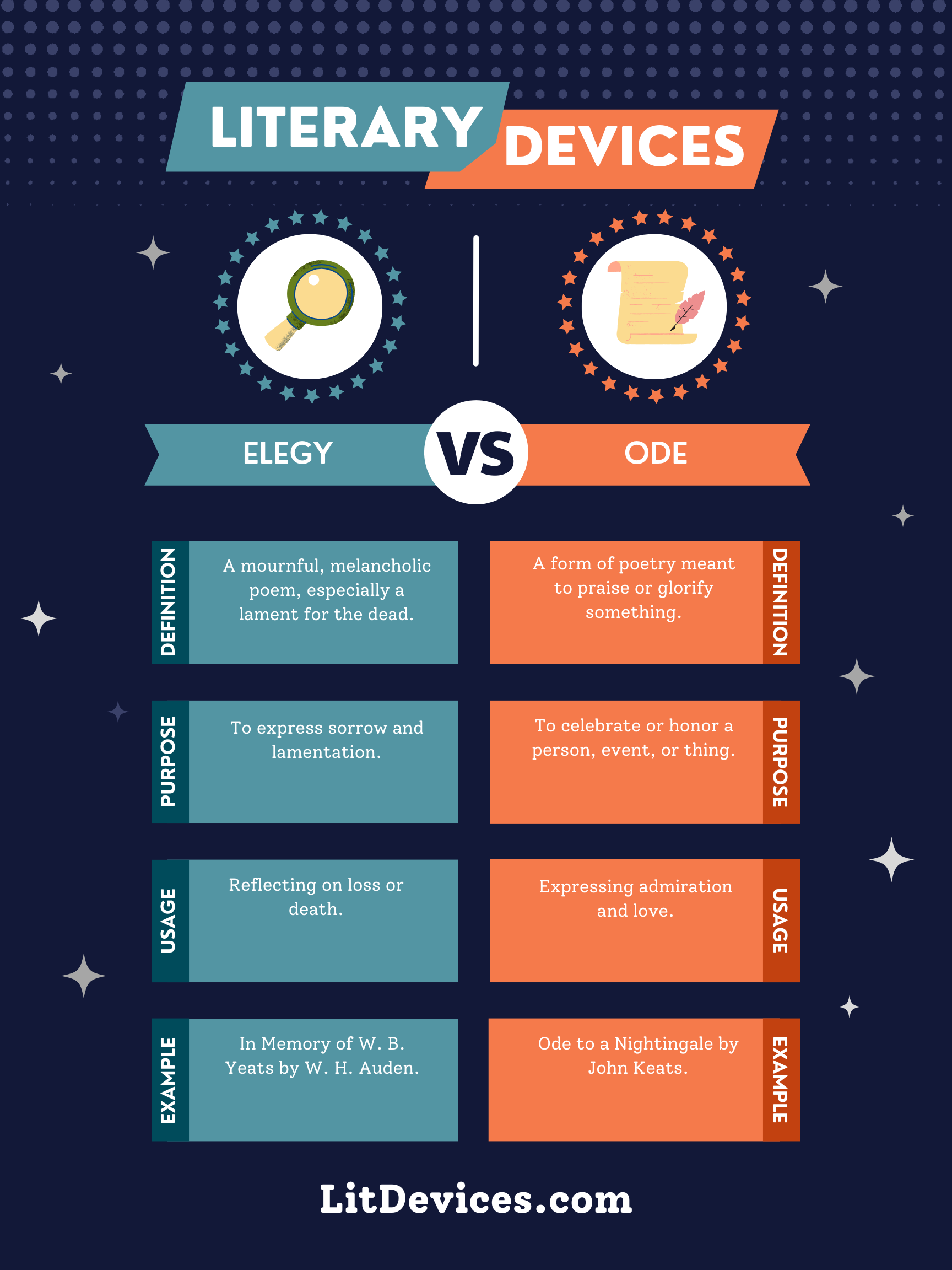Elegy is a mournful, melancholic or plaintive poem, especially a funeral song or a lament for the dead; Ode is a form of stately and elaborate lyrical poem, often praising or addressing a particular subject.
In the rich landscape of poetry, elegies and odes stand out for their emotional depth and formal beauty. Each serves a unique purpose, capturing feelings of loss or admiration with intensity and grace. Let’s delve into the characteristics that define these poetic forms. 🕊️🌹
Elegy
Traditionally, an elegy is a reflective poem that laments the loss of someone or something. It can serve as a tribute to the deceased, expressing grief, sorrow, and admiration. One of the most famous elegies in English literature is Thomas Gray’s “Elegy Written in a Country Churchyard,” which meditates on the inevitable fate of humans and the unnoticed passing of the humble.
Ode
An ode, by contrast, is a celebratory poem that praises people, events, or concepts. Odes are known for their lofty style and formal structure, often addressing the subject directly. John Keats’ “Ode to a Nightingale” is a quintessential example, exploring themes of nature, beauty, and transience through the admiration of the nightingale’s song.
Summary
| Literary Device | Definition | Purpose | Usage | Relevant Examples |
|---|---|---|---|---|
| Elegy | A mournful poem lamenting the loss of someone or something. | To express grief and reflect on loss. | Funerals, memorials, reflection. | “Elegy Written in a Country Churchyard” by Thomas Gray. |
| Ode | A lyrical poem praising or addressing a particular subject. | To celebrate and admire people, events, or ideas. | Celebrations, tributes, admiration. | “Ode to a Nightingale” by John Keats. |
Writing Tips
Whether you’re drawn to the somber tones of the elegy or the exultant notes of the ode, these tips can help you craft your own:
- For Elegies: Focus on genuine emotions. Reflect on personal memories or societal impacts to convey depth and authenticity.
- For Odes: Elevate your language. Use imagery and metaphors to glorify your subject, capturing its essence in your praise.
FAQs
Can an elegy be about something other than death?
Yes, while traditionally associated with mourning, modern elegies can lament any significant loss or change.
Does an ode always have to be positive?
Primarily, yes. Odes are meant to express admiration and praise, though they can also explore the complexities or challenges related to the subject.
Exercise
Read the following excerpt and decide whether it’s more likely an elegy or an ode:
“In the quiet solitude of the garden, she whispered to the roses, her words a tender eulogy for the love they once shared, now lost to the whispers of time.”
Answer: This passage is more characteristic of an elegy, focusing on loss and reflection.
Other Interesting Literary Device Comparisons
- Sonnet vs. Villanelle: Both are structured poetic forms, but sonnets typically explore a single theme, while villanelles employ repeating lines and a complex rhyme scheme for dramatic effect.
- Haiku vs. Tanka: These Japanese poetic forms capture nature and emotion, with haiku consisting of three lines and tanka extending to five, allowing for deeper expression.
- Free Verse vs. Blank Verse: Free verse eschews consistent meter and rhyme, offering poets freedom in expression, whereas blank verse retains a consistent meter (usually iambic pentameter) without rhyming.
Exploring these varied forms enriches our understanding of poetry, inviting us to appreciate the myriad ways poets express the depth of human experience. 📚💫

